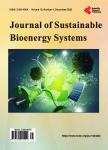Bamboo Biomass for Bioenergy Production in Mauritius
Bamboo Biomass for Bioenergy Production in Mauritius作者机构:GEOTOP & Institute of Environmental Sciences UQAM Montréal Canada
出 版 物:《Journal of Sustainable Bioenergy Systems》 (可持续生物质能源系统(英文))
年 卷 期:2022年第12卷第4期
页 面:82-98页
学科分类:0202[经济学-应用经济学] 02[经济学] 020205[经济学-产业经济学]
主 题:Bamboo Bambusia vulgaris Bambusia bambos Biomass Renewable Energy Gross Calorific Value Community Acceptance
摘 要:Bamboo, globally renowned as being one of the fastest-growing plants in the world with versatile applications, has gained increasing attention during the past decades. It is being used by millions of people around the globe as a biomass resource for energy production, as timber for furniture making, in the food industry and many more. So far, on the Island of Mauritius, little to no consideration has been given to this fascinating plant. This paper presents the physical and chemical properties of two species of bamboo—Bambusia vulgaris and Bambusia bambos, compared to sugarcane bagasse for bio-energy production. Ten samples of each species were tested for gross calorific value (GCV), moisture, ash and chloride content. The results show that both species have a very good potential for energy recovery with a GCV of 16.77 MJ/kg for Bambusia vulgaris and 17.44 MJ/kg for Bambusia bambos, and are valuable sources of biomass with an average energetic yield of 717.8 GJ/ha/yr and 1587.1 GJ/ha/yr respectively. In comparison, the GCV for sugarcane bagasse was found to be 18.33 MJ/kg with an energetic yield of 824.9 GJ/ha/yr. Simultaneously, a research survey on community acceptance and perception of the Mauritian citizens towards the utilisation of bamboo biomass as an alternative to fossil fuels for bio-energy production was conducted via semi-structured questionnaires. The questionnaires were administered to a total of 54 respondents. 3 women and 3 men were randomly interviewed in each of the 9 districts of the island. The results show that the participants are very much aware of the many issues related to the exploitation of fossil fuels and support the use and implementation of renewable sources of energy for bio-energy production. Eighty percent of the participants supported the implementation of bamboo biomass in the overall energy generation mix in a bold move to lessen their ecological footprint.



